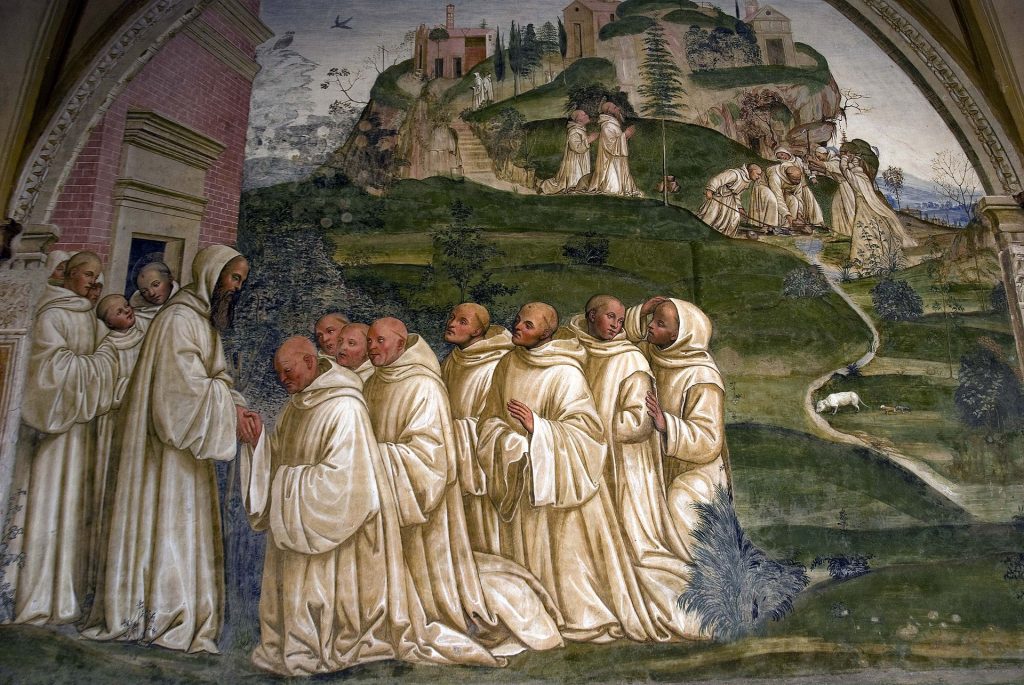Omnes in Christo unum sumus (II:4)

12 Jan. 13 May. 12 Sept.
Let him make no distinction of persons in the monastery. Let not one be loved more than another, unless he be found to excel in good works or in obedience. Let not one of noble birth be put before him that was formerly a slave, unless some other reasonable cause exist for it. But if upon just consideration it should so seem good to the Abbot, let him arrange as he please concerning the place of any one whomsoever; but, otherwise, let them keep their own places; because, whether bond or free, we are all one in Christ, and bear an equal rank in the service of one Lord, “For with God there is no respecting of persons.” Only for one reason are we preferred in His sight, if we be found to surpass others in good works and in humility. Let the Abbot, then, shew equal love to all, and let the same discipline be imposed upon all according to their deserts.
Saint Benedict’s exhortation to cultivate the same love towards all, and to exclude all favouritism and partiality, is rooted in Saint Paul’s teachings on unity and on the equality of all in Christ. The abbot’s love for all his sons is indispensable if the community is to grow harmoniously and fruitfully. The abbot will, therefore, remember the Apostle’s worrds:
For there is no respect of persons with God. (Romans 2:11)
There is neither Jew nor Greek: there is neither bond nor free: there is neither male nor female. For you are all one in Christ Jesus. (Galatians 3:28)
The Lord both of them and you is in heaven; and there is no respect of persons with him. (Ephesians 6:9)
With regard to the somewhat thorny question of rank in the community, Saint Benedict excludes all promotions and privileges based on one’s former social standing, or financial portfolio, or position in the world. This does not mean that a man leaves his learning, his professional accomplishments, and his skills at the door of the monastery. Nor does it mean that a man is expected to deny his culture, his genealogy, and his family history. There is room in Benedictine life for every good thing that develops mind and body, that fosters beauty, and that rejoices the heart. The abbot may ask a brother to maintain and, insofar as possible, develop and perfect skills and qualifications acquired in the world, “that God may be glorified in all things” (Chapter LVII). As the Apostle says:
For the rest, brethren, whatsoever things are true, whatsoever modest, whatsoever just, whatsoever holy, whatsoever lovely, whatsoever of good fame, if there be any virtue, if any praise of discipline, think on these things. (Philippians 4:8)
Saint Benedict does not say that no one can be invited to a higher rank in the community, but he establishes, to this end, criteria of his own:
Let not one be loved more than another, unless he be found to excel in good works or in obedience. (Chapter II)
Saint Benedict’s criteria for promotion are those of the Gospel. The abbot may invite a brother in the last place to come up higher. He may see that the promotion of a humble, virtuous, obedient brother may have a beneficial effect on the whole community. In promoting a virtuous brother to a higher rank, the abbot is simply following the teaching of Our Lord:
You are the light of the world. A city seated on a mountain cannot be hid. Neither do men light a candle and put it under a bushel, but upon a candlestick, that it may shine to all that are in the house. So let your light shine before men, that they may see your good works, and glorify your Father who is in heaven. (Matthew 5:14–16)
One sometimes encounters among pious people the rather dour and depressing idea that no one should manifest any special gift, that the virtuous thing is to bury one’s talents, and that equality means mediocrity for all. There are not a few religious people who hold to the curious notion that excellence is always a threat to humility and that leveling everyone to the lowest common denominator is somehow good for the soul. A Benedictine monastery ought rather to be a place where excellence is at home, where men are encouraged to cultivate their natural gifts, and where every skill and discipline acquires the nobility of a liturgical finality by redounding to the glory of God. Saint Benedict, I am certain, comes down on the side of the man who, upon his return from a journey, asked his servants for an account of their administration. To the servant who used his talents wisely, he said:
Well done, good and faithful servant: because thou hast been faithful over a few things, I will place thee over many things: enter thou into the joy of thy lord. (Matthew 25:23)
